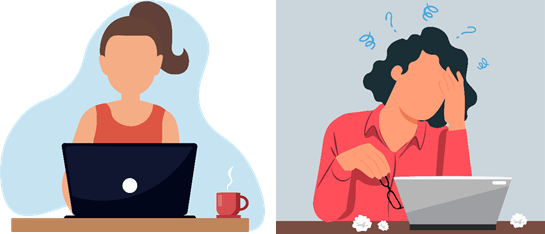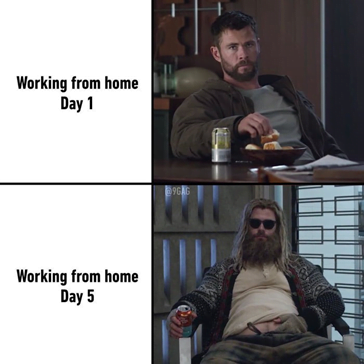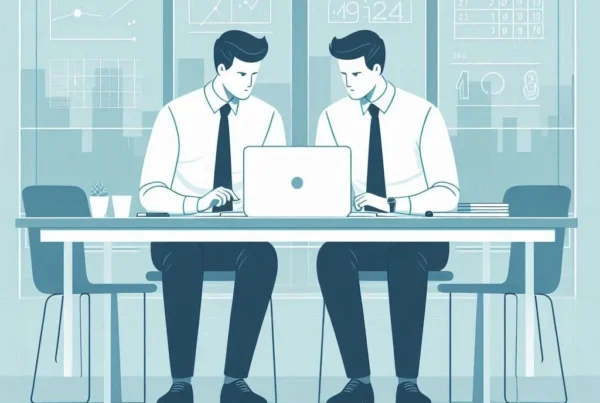Lockdown has been going on for such a long time that it has redefined how we work and operate on a day-to-day basis. For those who are lucky to have jobs during lockdown, it certainly has not been easy. Exhaustion and over-exertion has crept in and the high expectations of employers has risen due to the precarious economic state. It has instigated “work-from-home fatigue”, which is another real concern in Covid-19 times. Certainly, when the work-from-home movement was being phased in, we thought it would be a great and exciting idea. Now however, it seems to have become one of those “expectation vs reality” memes:

Many work-from-home (telecommuting) employees are becoming victim to fatigue as the workloads have increased and employees are working longer hours that they would not have done had they been in the office. Employers are under immense pressure to keep retrenchments low and make sure that their hardworking people are still employed. All in all, everyone is under immense pressure for different reasons.
With these hardships in mind, we thought it would be interesting to look at how the world of work has changed, and make suggestions on how to ensure that employees are not getting stressed out and are maintaining healthy mental balance.
Flexible Working Hours
I believe that there are many outdated practices in the workplace, one of which is traditional working hours. If we all started work at 9 AM and ended at 5 PM, travelling to the office would be a traffic nightmare. Many companies use flexible hours, which has incredible advantages over the traditional fixed work hours. Firstly, you can use it to match the kind of person you are: if you are a “morning person” or a “late starter”. Flexi-hours allows you to match your work hours with your sleep cycle.
Secondly, flexi-hours has the benefit of allowing for “life” to happen. If you had a torrid night when your child was sick, would your boss still expect you to start work at 7 AM? Companies should get rid of strict work hours and replace them with flexi-hours as far as is possible, while only keeping set core hours in the day for meetings and other engagements.
Keeping strict “Do Not Work” times
The lines between work and off-time seem to have become distorted as many of us are working from home. It is important to keep time aside to do the usual human needs during work hours, such as lunch time, a few minutes to fetch tea/coffee and a few minutes to destress.
One recurring issue is that employees are working longer hours than they should. I believe that you should keep to your hours and spend the least amount of time doing work when you are not getting paid for those hours. Now, there are split views about working extra hours, and obviously one should complete all of their daily tasks before logging off. Napoleon Hill states says that anyone that does more than they are paid for will soon be paid for more than they do. I definitely believe that hard work is needed in any endeavor, however I believe that one should work for an equal reward.
Also understand this: Do not use the time you would have wasted in travel to work. Just because we are working from home does not mean that we should be working all the time.
Compartmentalize your work area
Where possible, separate work space out from your living space. Again, the line between work and leisure becomes blurred if you are trying to concentrate on finding the errors in your Excel spreadsheet while you can see your TV remote close by. Implement some environmental design: make your working space consist of only your work computer, some diaries and a refreshment. Make it close to how you would be if you were in the office. Also, try to keep your phone out of reach of your hands. It is a strange mental que, however it has ways to improve productivity. Nate O’Brien leaves his phone in a cookie jar which has a timed lock on the lid, to ensure that his investing work stays uninterrupted.
I would also suggest you read an article or watch a video on workplace ergonomics which will give you useful tips on setting up your workplace. Consideration must be given to the type of chair used (back support), height of laptop relative to you, lighting, etc. This reduces fatigue and any negative impact on your body.
Try something new

While some took the opportunity to eat more while at home, many others have taken advantage of extra time that would have normally been wasted in traffic to try new things. Being at home opens the path to many new exciting endeavors. A new healthy stimulant to the brain can have massive positive exuberance towards your mentality and vitality. Meditation, exercise and healthy eating are examples of “keystone habits”, which was described by Charles Duhigg in 2012 as habits that tend to support other habits. For example, exercise habits tend to support other good habits such as eating healthily, having better sleep and reducing stress. Experiment with some keystone habits and watch as how they can help to reduce work-from-home stresses among other stresses.
Closing Thoughts
While it certainly has not been easy as we had hoped, working from home may be here to stay for some time. Even after Covid has passed, many employees would prefer to telecommute over going to the office. Therefore, it is important to have a clear line between “working from home” and “being at home”. Employers should try to implement flexible working hours for their employees, and together they should implement strict times to not do any work. It is important for employees to section out their time and space to work, and to implement some keystone habits into their daily routine to ensure peaceful mind and body. Remember, the most important asset in a business will always be the employees.
Author
Trishen Naidoo is the co-director of Fulcrum Venture Capital (FVC), a start-up company based in Durban that focuses on digital marketing and investing. FVC have enlisted the services of Nikshen Consulting to assist in growing their business with the correct coaching and guidance.


![Surviving working from home [Trishen Naidoo]](https://nikshen.com/wp-content/uploads/2020/11/scrabble-4958237_1920.jpg)


